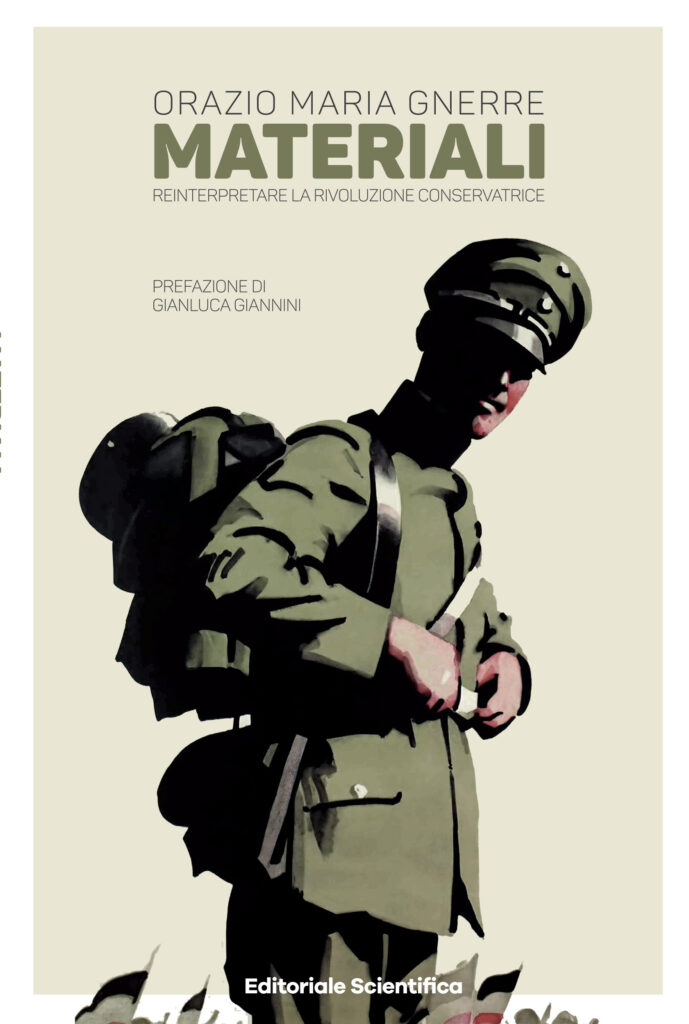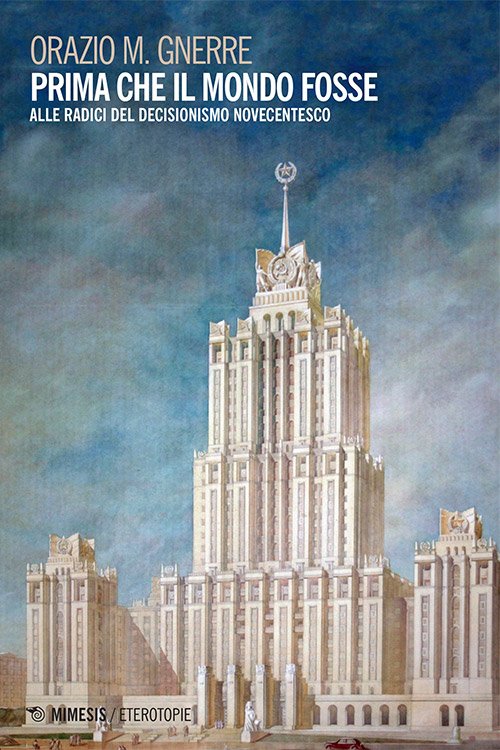I got to know Orazio Maria Gnerre through “Materiali. Reinterpretare la Rivoluzione conservatrice’ . He is a prolific young academic who continues his work at the University of Perugia. His other works are also interesting. Nihil Medium. Carl Schmitt tra passato e futuro (Nihil Medium: Carl Schmitt between past and future), Morlacchi, Perugia 2024: Prima che il mondo fosse. Alle radici del decisionismo novecentesco (Before the World was: To the Roots of the Twentieth-century Decisionism), Mimesis, Milano 2018. We discussed conservative revolutionism, Heiddeger, Ernst Jünger, Joseph de Meistre in the context of conservative revolutionism.
Let’s start by getting to know your book Materiali. Reinterpretare la rivoluzione conservatrice, Editoriale Scientifica, Naples 2021 (Materials: Reinterpreting the Conservative Revolution) and what is the purpose of this work?

The book, published by Editoriale Scientifica in 2021, aimed to re-examine the phenomenon of the German Conservative Revolution of the early twentieth century, and reread it from other points of view and perspectives. Specifically, the essential theme of the research proposed by the volume was to approach revolutionary-conservative thought by skimming its ideas until reaching the central node of this current of thought, which is in my opinion the relationship between human beings and technology, and therefore the great theme of human subjectivity in the face of the gigantic transformations imposed by political and economic modernity. The title of the book, therefore, refers precisely to the “material”, objective and concrete element, founding intersubjective relations and political-ideological transformations, according to the thinkers of the Conservative Revolution. In this sense, I also intended to reformulate the idea according to which this current of thought was an idealistic-spiritualist specificity: on the contrary, there is a “materialist” imprint (not in the sense of “anti-religious”, obviously, but based on the analysis of real power relations) in this discourse, and I tried to make it clear in the chapter on the relationship between the Conservative Revolution and Marxism. In doing so, I have precisely “reinterpreted” the phenomenon, distancing myself from the idea that it is a general climate of the twentieth century, but rather this term can be used to describe a real philosophical current that developed in the German context in that period, whose essential heart is represented by the theory of the Jünger-Schmitt-Heidegger triad.
What is the Conservative Revolution and can you give us an overview of its basic principles and historical background?

The historical context of this cultural phenomenon, which I interpret as a true philosophical school of thought (on a par with German idealism, Marxism, postmodernism, etc.), is that of early twentieth-century Germany. Ernst Jünger’s thought notoriously lays the foundations for the development of this theory with the acknowledgement of the transformation of the world through the great material deployment that occurred with the “storms of steel” of the First World War. We are on a similar level of analysis to that of the birth of modern industry already taken up by Marx’s thought, but radicalized in the vision of the not only constructive, but also destructive capacity of the techno-economic dimension. Faced with the titanic dimension of great transformations, the human being became a helpless dot that allowed itself to be dragged by phenomena of colossal, unstoppable, global proportions. The task of revolutionary-conservative thought, at that point, was to restore a dimension of “anthropological sovereignty” to the human being, to impress upon him a dimension of meaning, and a purpose in overcoming a historical-philosophical impasse that seemed (and still seems) insurmountable. On the theme of sovereignty as a radical anthropological dimension – a central theme at the beginning of the twentieth century and especially in revolutionary-conservative reflection – I would also like to point out my speculations in Prima che il mondo fosse. Alle radici del decisionismo novecentesco, Mimesis, Milan 2018 (Before the World Was: To the Roots of the Twentieth-century Decisionism).
From the perspective of conservative revolutionism, why did Joseph de Maistre strongly criticise liberalism? How did the political parties and views nowadays characterised as ‘liberal right’ emerge and how can these developments be related to de Maistre’s criticisms?
Joseph de Maistre, an eighteenth-century conservative thinker, strongly criticized liberalism in its anthropological and spiritual dimension, as a disintegrating force that essentially opposed any form of political and, indeed, spiritual order of humanity. This discourse, which obviously dealt with very different problems compared to those that were subsequently approached by the German conservative Revolution, however found a space for reflection within that subsequent discourse. Specifically, Schmitt’s analysis took into consideration the thought of the Count of Savoy, glimpsing in it a whole series of questions relating to the relationship between public and private, between discussion and decision, which constituted, according to the Jurist of Plettenberg, the basis of the so-called “thought of the Counter-Revolution”. This thought had, according to Schmitt, largely anticipated some historical tendencies (sometimes, even of a geopolitical-internationalist nature). In my aforementioned essay on twentieth-century decisionism, I have extensively discussed the direct and indirect influences of De Maistre and Rousseau’s thought on the thought of anti-liberal criticism in the twentieth century, demonstrating how the Count in many ways proved to be anticipatory with respect to questions that would explode later.
As regards the question of the “liberal right”, it is interesting to note how De Maistre’s criticism of liberalism was so radical as to propose itself far outside the republican scheme of modern right and left wings. De Maistre was already a supporter of the idea of the globality of politics and its organization in civilizational schemes, that is, the opposite of the distribution of ideas in internal fields such as “right wing” and “left wing”. In his texts and in those of his scholars and followers, many concepts close to what today would be defined as the “liberal right” are criticized, starting from the principle of inalienable private property.
What are 20th century philosopher Heidegger’s ideas that make him a ‘conservative revolutionary’? In what ways did his philosophy support the idea of ‘conservative revolutionism’?
To put it very briefly, it is the question of technology that makes in my opinion Heidegger a conservative revolutionary, and specifically one of the three key thinkers of this philosophical current. Each of the three, according to my analysis, had a differentiated perspective on the possible outcomes of the redefinition of the spaces of influence between modern technology and human sovereignty, but they speculated similarly on the central questions of this “battle”. The question of technology, which in Heidegger is closely intertwined with that of the history of Western philosophy and metaphysics, takes on the aspect of the measure of the growing nihilism in contemporary society, and emerges as a gigantic question of a destinal nature. It is precisely this that makes this author a thinker of the Conservative Revolution. His essential idea, and his contribution to the speculative dimension of the Conservative Revolution, was that of the need to re-establish an order of language in order to accommodate a great transformation that would come from a great movement of ontological revelation.
How would you evaluate the interaction between Heidegger and Jünger, how the two thinkers were influenced by each other and their place in conservative revolutionary thought? In particular, what are their different approaches to the issue of technology?
Notoriously, both these thinkers interacted in various ways and on various levels until they converged in the writing of the famous text Über die Linie. As we know, this was a dialogue on the role of technology in the contemporary age and on the dissipation and overcoming of the nihilistic phase. Within this dialogue, consisting of two essays, the two thinkers expressed a different approach to the question: in the interpretation of the different meaning of the title (on the one hand “on the line”, on the other “beyond the line”) lies the difference in the approach of the two thinkers. Jünger believed that the human being and his civilization had already started to overcome the nihilistic phase, while Heidegger believed that nihilism was still the dominant figure of our life. Precisely in this interregnum the human being had to prepare and await the event that would reopen the perception of being. These different approaches, however, both gravitated around the thematic point of attraction that represents the key to understanding the entire school of thought of the Conservative Revolution: the binomial technology-nihilism. It is on this basis that we can consider both thinkers as philosophers of the Conservative Revolution.
Is ‘conservative revolutionism’ in an upward trend today?
Yes, and no. If we consider the concept of “conservative revolution” extensively as a tendency that somehow unites the contemporary era and cultural traditions, or more broadly a non-nihilistic vision of existence, we can say that an awakening of this type of consciousness is taking place on multiple levels and in multiple parts of the globe. In a certain sense, we can consider how we are approaching an exhaustion of certain philosophical and cultural theories or approaches that have characterized political, social and ideological modernity. These approaches and theories are becoming evident in the cultural dialectic, and in doing so they are generating their own antitheses. Nonetheless, we still live in an epochal confrontation with the problematic distortions imposed by the superpower of technology, as well as by the centralization of resources typical of capitalist society. We can therefore say that we are still completely immersed in this social and philosophical contradiction that was highlighted, at the beginning of the last century, by revolutionary-conservatives. In this sense, the question arises, as already said, as a dialectical movement of history, which is articulated in affirmations and negations of the two great elements identified by the Conservative Revolution as polar antitheses: the human subject and its negation. Reading Über die Linie in this sense can provide us some categories to interpret the current historical phase.

Pingback: Orazio Maria Gnerre: È la questione della tecnologia che fa di Heidegger un rivoluzionario conservatore - Eren Yeşilyurt